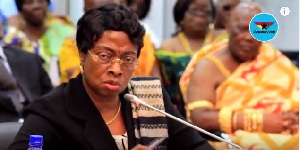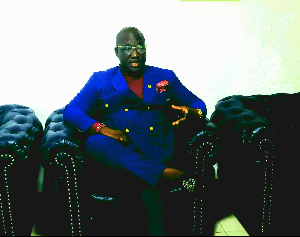- Home - News
- TWI News | TV
- Polls
- Year In Review
- News Archive
- Crime & Punishment
- Politics
- Regional
- Editorial
- Health
- Ghanaians Abroad
- Tabloid
- Africa
- Religion
- Election 2020
- Coronavirus
- News Videos | TV
- Photo Archives
- News Headlines
- Press Release
General News of Sunday, 18 June 2017
Source: dailguideafrica.com
Sophia Akuffo grilled for CJ job
Chief Justice-designate, Justice Sophia Akuffo, was yesterday subjected to almost six hours of grueling vetting in parliament, with the minority National Democratic Congress (NDC) on the Appointments Committee trying to test her integrity in her judgement – particularly on the Montie 3, who were jailed for contempt of court and were granted pardon by former President John Dramani Mahama.
Three NDC activists – Godwin Ako Gunn, Alistair Nelson and Salifu Maase, popularly called Mugabe – who were later named Montie 3, were hauled before the Supreme Court for contempt for scandalizing the court and defaming the immediate-past Chief Justice, Georgina Theodora Wood, on Montie FM, a pro-NDC radio station in Accra, in September last year.
Justice Akuffo, who chaired the five-member panel of Supreme Court judges that heard the case, slapped the trio with a four-month imprisonment and a fine of GH¢10,000 each, after they had pleaded guilty to the contempt charge, while three directors of the radio station were also made to pay a fine of GH¢30,000 each.
The minority members of the committee, including the chief whip and MP for Asawase, Mohammed Mubarak Muntaka; MPs for Asunafo South, Eric Opoku; Bodi, Sampson Ahi; Tamale North, Suhuyini Alhassan Sayibu and North Tongu, Samuel Okudzeto Ablakwa, tried to compare the case in which the former General Secretary of the New Patriotic Party (NPP), Kwadwo Owusu Afriyie, popularly called Sir John, current National Youth Organiser of the NPP, Sammy Awuku; an activist of the party, Hopeson Adorye, were pardoned by the Supreme Court on similar contempt charges, with that of the Montie 3.
Justice Akuffo told the committee that each contempt case is determined on its own merits and that the sentences handed to the Montie trio were in line with the degree of offence.
According to her, since the offence by the trio was a serious attack on the court, the sentence was to help protect the sanctity and integrity of the court.
Integrity
Chief Jutice-designate, Justice Sophia Akuffo said she had always stood for integrity, which she said would drive her to offer quality leadership to the Judicial Service to ensure quality and equal justice for all.
She said her aim is to produce quality judges for quality justice.
According to the incoming Chief Justice, her passion had been integrity, nationalism and development; and these would allow her to wholeheartedly lead the judiciary with high sense of integrity so that it would be completely independent and very effective.
On the vexed issue of corruption within the judiciary, the Chief Justice-designate said that the canker is based on perception, even though there might be some few judges who could be compromised in the delivery of justice.
She said to help rid the judiciary of any corruption, it would be important to review the processes of appointing judges to the bench.
“It is time to take a critical look at the appointment process and the procedural guidelines to help transparency,” she said, adding that strictly enforcing the code of conduct for judges would also help to sanitise the system.
She said that would ensure that justice delivery in the country is not met halfway.
According to her, “The judicial process is supposed to be insulated not only from political influences, but from all forms of influences. To shield it, there are many interventions – part of it has to do with enforcing the code of conduct of judges.
“One of the indexes of quality justice is independence and to shield the judiciary further from external influences, maybe we need to take a second look at the appointment process.”
Mob Justice
On her take on mob justice, Madam Sophia Akuffo said that the court could not be blamed for any mob justice and that she does not subscribe to any such practice.
She, however, noted that mob justice might have some remote and immediate causes as many people might not have confidence in the delivery of justice and would therefore resort to instant justice, which is condemnable.
She said she would ensure that cases before courts are dealt with in a speedy but effective manner; and that is why she would move for the full automation of all courts in the country with the necessary funding from government.
According to the Chief Justice-designate, it is important to place in the right perspective that even though it is the Executive that supports the Judiciary with funds, there is no way the executive can influence the judiciary to move in a certain political direction.
“We don’t do politics and there is no way any judge worth his salt will give any political judgement,” she posited.
Ms Sophia Akuffo advocated for non-custodial sentences to help decongest the prisons, adding that the laws guiding that must be made by the legislature.
She also supported the death sentence since it is in the statute books.
“I want to assure the nation that the judiciary, under my leadership, would be truly independent and very effective to help instill investor confidence in the judicial system,” she pledged.
President Akufo-Addo nominated Justice Akuffo to be Chief Justice in accordance with Article 144 of the 1992 Constitution and if the Committee approves her nomination, she will become the second woman to occupy the highest office of the judiciary.
Justice Akuffo was born on 20th December, 1949 and hails from Akropong Akuapim in the Eastern Region.
The 67-year-old justice of the Supreme Court has a daughter and two grandchildren.
She was appointed to the Supreme Court by former President Jerry John Rawlings on 30th November 1995 and has served the court for many years.











